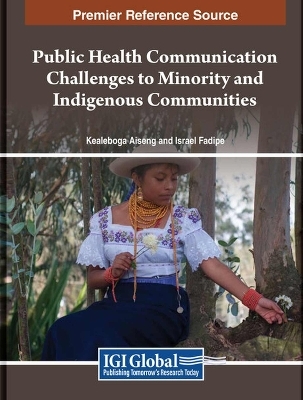
Public Health Communication Challenges to Minority and Indigenous Communities
Seiten
2024
IGI Global (Verlag)
979-8-3693-0624-6 (ISBN)
IGI Global (Verlag)
979-8-3693-0624-6 (ISBN)
Sheds light on the linguistic dimensions of public health communication during the COVID-19 era. By investigating the impact of language on various aspects of society, from medical information to education, this book synthesizes the wealth of sociolinguistic research into an accessible framework.
Language has emerged as both a powerful bridge and a formidable barrier in the realm of public health communication. The ongoing COVID-19 pandemic has highlighted a significant challenge faced by minority and indigenous communities, particularly in regions of Sub-Saharan Africa. It's a challenge deeply rooted in the historical use of colonial languages—English, French, and Spanish—to disseminate critical health information. For many, this has translated into a linguistic exclusion, depriving them of access to essential resources and a voice in matters of national interest. This issue transcends mere communication; it touches upon the fundamental rights of individuals to participate in their own healthcare decisions and influences their sense of belonging and citizenship. Public Health Communication Challenges to Minority and Indigenous Communities proposes a solution with a transformative potential. This groundbreaking edited volume invites scholars from diverse fields to contribute their research, shedding light on the linguistic dimensions of public health communication during the COVID-19 era. By investigating the impact of language on various aspects of society, from medical information to education, this book seeks to synthesize the wealth of sociolinguistic research into an accessible framework. It's an invitation to explore the role of language in shaping our perceptions of citizenship, belonging, and empowerment. For students, researchers, and academics working in fields such as sociolinguistics, language policy, education, health communication, and African studies, this publication is an invaluable resource. Public Health Communication Challenges to Minority and Indigenous Communities offers not only a deep dive into a critical issue but also a blueprint for a more inclusive and equitable future in public health communication. As experts navigate the complex terrain of linguistics and healthcare, this book illuminates a path toward a world where linguistic diversity is celebrated and every voice, regardless of language, matters in the discourse of public health.
Language has emerged as both a powerful bridge and a formidable barrier in the realm of public health communication. The ongoing COVID-19 pandemic has highlighted a significant challenge faced by minority and indigenous communities, particularly in regions of Sub-Saharan Africa. It's a challenge deeply rooted in the historical use of colonial languages—English, French, and Spanish—to disseminate critical health information. For many, this has translated into a linguistic exclusion, depriving them of access to essential resources and a voice in matters of national interest. This issue transcends mere communication; it touches upon the fundamental rights of individuals to participate in their own healthcare decisions and influences their sense of belonging and citizenship. Public Health Communication Challenges to Minority and Indigenous Communities proposes a solution with a transformative potential. This groundbreaking edited volume invites scholars from diverse fields to contribute their research, shedding light on the linguistic dimensions of public health communication during the COVID-19 era. By investigating the impact of language on various aspects of society, from medical information to education, this book seeks to synthesize the wealth of sociolinguistic research into an accessible framework. It's an invitation to explore the role of language in shaping our perceptions of citizenship, belonging, and empowerment. For students, researchers, and academics working in fields such as sociolinguistics, language policy, education, health communication, and African studies, this publication is an invaluable resource. Public Health Communication Challenges to Minority and Indigenous Communities offers not only a deep dive into a critical issue but also a blueprint for a more inclusive and equitable future in public health communication. As experts navigate the complex terrain of linguistics and healthcare, this book illuminates a path toward a world where linguistic diversity is celebrated and every voice, regardless of language, matters in the discourse of public health.
Kealeboga Aiseng holds a PhD in African Languages and Linguistics from the University of the Witwatersrand. He is a lecturer in the department of journalism and media studies at Rhodes University, Makhanda. Aiseng's research interests are sociolinguistics, language policy, African popular culture, new media and film studies. He has published articles in local and international journals. He also serves on numerous journal editorial boards.
| Erscheinungsdatum | 02.05.2024 |
|---|---|
| Verlagsort | Hershey |
| Sprache | englisch |
| Maße | 216 x 279 mm |
| Gewicht | 272 g |
| Themenwelt | Geisteswissenschaften ► Sprach- / Literaturwissenschaft ► Sprachwissenschaft |
| Studium ► Querschnittsbereiche ► Prävention / Gesundheitsförderung | |
| Sozialwissenschaften ► Ethnologie | |
| Sozialwissenschaften ► Politik / Verwaltung ► Staat / Verwaltung | |
| Sozialwissenschaften ► Soziologie | |
| ISBN-13 | 979-8-3693-0624-6 / 9798369306246 |
| Zustand | Neuware |
| Informationen gemäß Produktsicherheitsverordnung (GPSR) | |
| Haben Sie eine Frage zum Produkt? |
Mehr entdecken
aus dem Bereich
aus dem Bereich
das Manual zur psychologischen Gesundheitsförderung
Buch | Hardcover (2023)
Springer Berlin (Verlag)
39,99 €
Wissenschaftlich basierte Empfehlungen, Tipps und Ernährungspläne für …
Buch (2022)
Thieme (Verlag)
51,00 €


